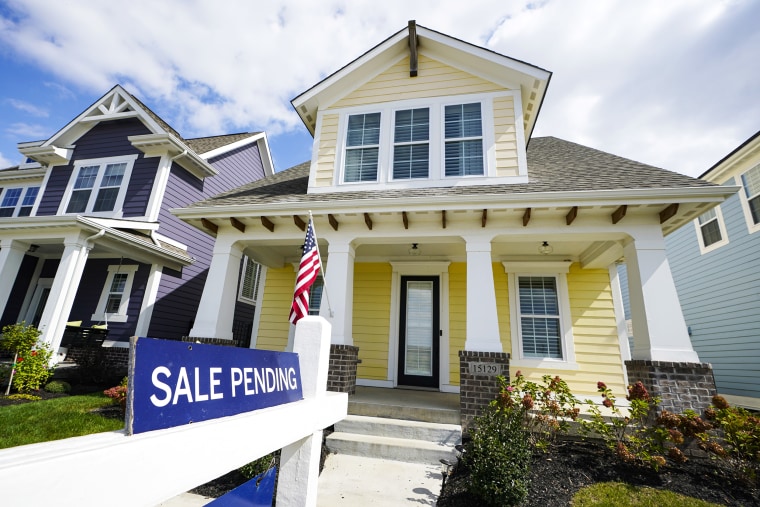Whether you're contemplating buying or selling a house these days, it's likely you're a baby boomer — or are financially supported by one.
At $436,800, the median home sale price in the U.S. remains significantly higher than the $329,000 average price seen in the quarter just before the late winter 2020 period, when the Covid-19 pandemic struck.
And it continues to inch higher: The monthly S&P CoreLogic Case-Shiller housing market index showed relative price increases for February, March and April.
“The ongoing recovery in home prices is broadly based,” Craig Lazzara, managing director at S&P DJI, said in a release. All 20 major metro markets logged monthly price gains in April, and 12 markets showed price acceleration, the report found.
With affordability at near-record lows and inventory still very limited, many buyers, especially first timers, will continue to find the market challenging for the foreseeable future, experts say.
Mortgage interest rates now hover around 7%. As a result, the median monthly payment (principal and interest) a home buyer can now expect to pay is nearly $2,000, according to the National Association of Realtors — almost double the 2020 figure.
Buyers need to earn more money, too. An income of about $95,000 per year is needed to qualify for a 30-year mortgage with a 20% down payment (the NAR's calculations are based on a slightly lower estimate of the current median home value).
"There will be no return to the 3% rates we had during the pandemic," Bright MLS chief economist Lisa Sturtevant said in a statement Thursday. "Homebuyers have had to accept the ‘new normal’ of rates around 6.5% or even a little higher."
Who is driving the current market rebound?
To a large degree, it's all-cash buyers. These individuals are able to sidestep mortgage rates entirely and purchase a home outright at cost.
Last month, the real estate data group Redfin reported the share of all-cash purchases had increased to one-third of the entire U.S. housing market, the highest level since 2014.
While the demographics of these buyers may be mixed, there is overwhelming evidence that some baby boomers are an economic force behind these cash purchases, experts say.
"Some cash sales are coming from millennials, but they may be borrowing from 'the bank of mom and dad' or a relative," said Taylor Marr, Redfin deputy chief economist.
Marr added that the homeownership rate of Generation Z adults (age 18 to 27) has already surpassed the rate of Generation X (age 44 to 59) who owned homes when they were still in their 20s, a phenomenon also attributable to an older generation stepping in to help their kids become homeowners.
Some of these boomers have benefited from the skyrocketing values of their homes, which has led to “historically high levels of housing wealth,” Bright's Sturtevant said in a follow-up interview.
“It’s not like most people are emptying their checking accounts,” Sturtevant said. “They’re rolling over their housing wealth."
"Are there millionaires and the 1%? Yes. But it really has trickled down to the middle class,” Sturtevant said.
Whether a baby boomer is in the buyer's market looking to downsize or supporting a dependent, it is this group that has allowed the housing market to remain buoyant. The National Association of Realtors said in March that baby boomers now make up 39% of home buyers — the most of any generation — and an increase from 29% last year.
“Baby boomers have the upper hand in the home-buying market,” Jessica Lautz, NAR deputy chief economist and vice president of research, said in a statement. “The majority of them are repeat buyers who have housing equity to propel them into their dream home — be it a place to enjoy retirement or a home near friends and family. They are living healthier and longer and making housing trades later in life.”
Suburbs rule
As with anything housing-related, the health of the market also depends on location. The monthly S&P CoreLogic Case-Shiller housing market index for April showed that Miami, Chicago and Atlanta were seeing the highest year-over-year gains among 20 large cities. Overall, 17 of the 20 cities reported lower prices in April on a 12-month basis, with Boston, San Francisco and Cleveland showing slight increases of 0.1%, 0.1% and 0.9%, respectively.
There's also variation by density, with suburbs booming thanks to greater employment demand for individuals in their prime earning years, like millennials, who are also forming households and increasingly working from home.
New census data shows the percentage of U.S. workers who did their jobs from home increased from 5.7% of workers in 2019 (roughly 9 million people) to 17.9% in 2021 (about 27.6 million people) — and that about half of the work-from-home cohort is now between the ages of 25 and 44.
That's put urban-core areas at something of a disadvantage, Sturtevant said.
"As many people continue working from home, close commutes are not drawing people back into cities," she said, adding: "Cities are not back, and may never be back in terms of attracting the same level of buyers."
The revival of the suburbs also reveals how millennials, now America's largest overall demographic, have the same social preferences as their parents now that they've entered their child-rearing years.
"Back in 2018 or 2019, you would have said millennials would never move to the suburbs; it was all about back to the city, walkable neighborhoods, amenities," Marr said, adding: "But now that they're starting families and severing ties with the commute, there's less of a priority to have proximity to a city center. People are now valuing space, a home office, a yard.
"So I think the typical lifecycle of housing, where you buy or rent a condo or town home, then once you start growing a family, you move up to a larger space in suburbs — that’s consistent with every generation across ages."

